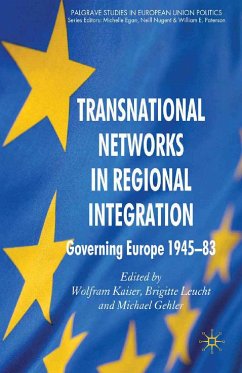
Transnational Networks in Regional Integration (eBook, PDF)
Governing Europe 1945-83
Redaktion: Kaiser, W.; Gehler, M.; Leucht, B.

PAYBACK Punkte
20 °P sammeln!
Shows that networks in European integration governance were not a phenomenon that developed in the 1980s out of a 'hollowing out' of the nation-states in the 1970s. Based throughout on newly accessible sources, the authors discuss various networks and show how they contributed to constitutional choices and policy decisions after World War II.
Dieser Download kann aus rechtlichen Gründen nur mit Rechnungsadresse in A, B, BG, CY, CZ, D, DK, EW, E, FIN, F, GR, HR, H, IRL, I, LT, L, LR, M, NL, PL, P, R, S, SLO, SK ausgeliefert werden.












